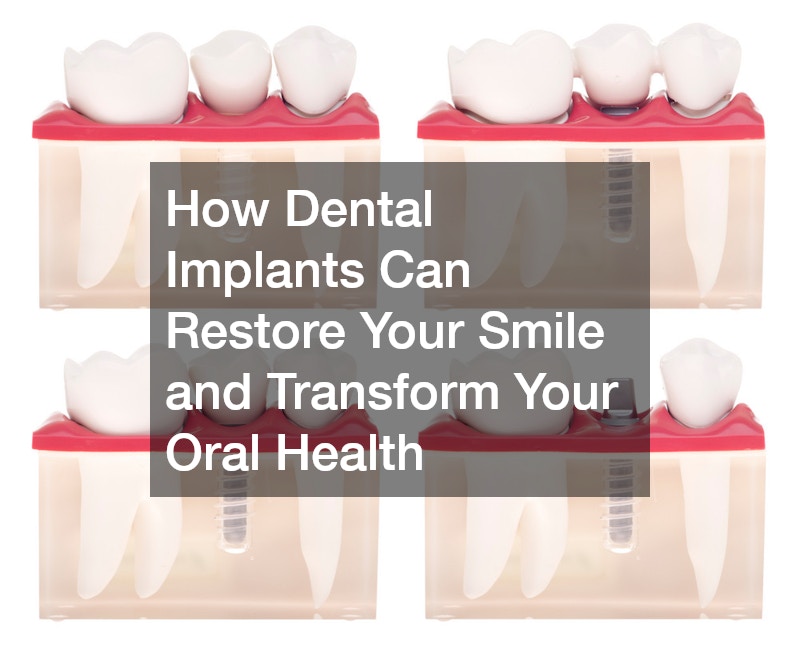
If you’re missing one or more teeth, you’re not alone—and you don’t have to live with the discomfort or self-consciousness that often comes with it. Dental implants are one of the most advanced and effective solutions for restoring your smile, improving your confidence, and protecting your long-term oral health. Unlike dentures or bridges, implants look, feel, and function just like natural teeth, giving you the freedom to eat, speak, and smile without worry.
What Are Dental Implants?
A dental implant is a small titanium post that serves as an artificial tooth root. It’s surgically placed into your jawbone, where it fuses naturally through a process called osseointegration.
Once healed, a custom-made crown, bridge, or denture is attached to the implant, completing your restoration.
Because they integrate directly with the bone, dental implants provide unmatched stability and durability. They’re the closest thing to having your natural teeth back—both in function and appearance.
Why Choose Dental Implants?
Dental implants are considered the gold standard for tooth replacement because of their many advantages over traditional options. Here’s why so many patients choose them:
- Permanent and durable: With proper care, implants can last a lifetime.
- Natural look and feel: They blend seamlessly with your natural teeth.
- Improved speech and comfort: No slipping or clicking like dentures.
- Preserves bone health: Implants prevent jawbone loss that occurs when teeth are missing.
- Easy to maintain: Brush and floss just like you would with natural teeth.
- Boosted confidence: Smile freely without worrying about gaps or shifting teeth.
Who Is a Good Candidate for Dental Implants?
Most healthy adults with missing teeth are candidates for dental implants. However, your dentist will evaluate several factors before recommending the procedure:
- You have healthy gums and adequate bone density.
- You’re in good overall health.
- You don’t smoke, or you’re willing to quit during the healing process.
- You’re committed to good oral hygiene and regular dental visits.
If you’ve experienced bone loss in your jaw, your dentist may suggest a bone graft to strengthen the area before implant placement.
Types of Dental Implants
Depending on your needs and how many teeth you’re missing, your dentist will recommend one of several implant options:
1. Single-Tooth Implants
Used to replace one missing tooth. The implant supports a single crown that matches your natural teeth perfectly.
2. Implant-Supported Bridges
If you’re missing several teeth in a row, two or more implants can support a bridge, eliminating the need to use neighboring teeth as anchors.
3. All-on-4 or Full-Arch Implants
This method replaces an entire set of teeth (upper or lower) using just four to six strategically placed implants. It’s a great alternative to traditional dentures, offering more stability and comfort.
4. Mini Dental Implants
These are smaller in size and often used when there isn’t enough bone for standard implants. They can also help stabilize dentures.
The Dental Implant Procedure
Getting dental implants is a multi-step process, but the results are well worth the time and care involved.
Step 1: Consultation and Planning
Your dentist will perform a thorough exam, including X-rays or 3D imaging, to plan the procedure and ensure the implant will fit perfectly.
Step 2: Implant Placement
During a minor surgical procedure, the implant post is inserted into the jawbone. Most patients experience minimal discomfort, and local anesthesia keeps the process painless.
Step 3: Healing and Integration
Over the next few months, the implant fuses with your jawbone, creating a strong foundation. During this healing period, you may wear a temporary restoration.
Step 4: Abutment and Crown Placement
Once healed, an abutment (connector) is attached to the implant, and your custom crown or restoration is placed. The final result looks and feels completely natural.
Caring for Dental Implants
One of the best parts about dental implants is how easy they are to maintain. Simply follow good oral hygiene habits to keep your implants and surrounding gums healthy:
- Brush twice a day with fluoride toothpaste.
- Floss daily, especially around the implant area.
- Visit your dentist for regular cleanings and checkups.
- Avoid using your teeth to open packages or bite hard objects.
- If you grind your teeth, wear a nightguard to protect your implants.
With proper care, dental implants can last decades—or even a lifetime.
How Much Do Dental Implants Cost?
The cost of dental implants can vary depending on the number of teeth being replaced, the materials used, and any additional procedures (like bone grafting). On average, a single dental implant costs between $3,000 and $5,000. While implants are more expensive upfront than dentures or bridges, their longevity and natural results make them a cost-effective investment over time.
Many dental offices offer financing options or payment plans to make implants more affordable. Some insurance plans may also cover a portion of the treatment if it’s deemed medically necessary.
Why Dental Implants Are Worth It
Replacing missing teeth is about more than just aesthetics—it’s about protecting your health and restoring your quality of life. Dental implants prevent bone loss, maintain your facial structure, and make it easier to eat your favorite foods again. Most importantly, they give you back your confidence to smile, speak, and laugh without hesitation.
Final Thoughts
If you’re tired of dealing with missing teeth or uncomfortable dentures, dental implants may be the ideal solution. With their natural look, incredible durability, and ability to preserve oral health, implants are truly a long-term investment in your smile.
Talk to your dentist today about whether you’re a candidate for dental implants. With the help of modern dental technology and expert care, you can enjoy a complete, beautiful smile that lasts a lifetime.



